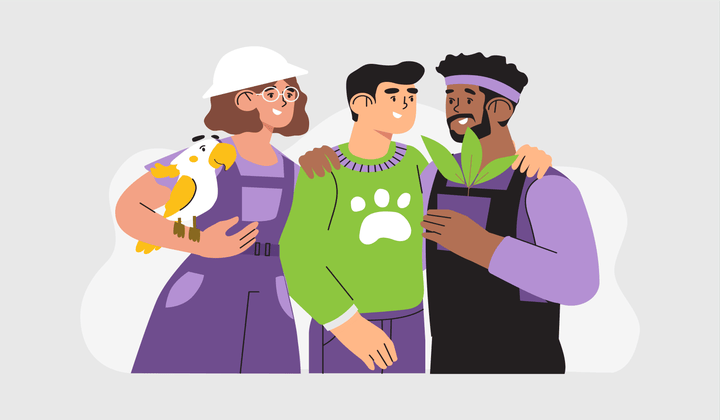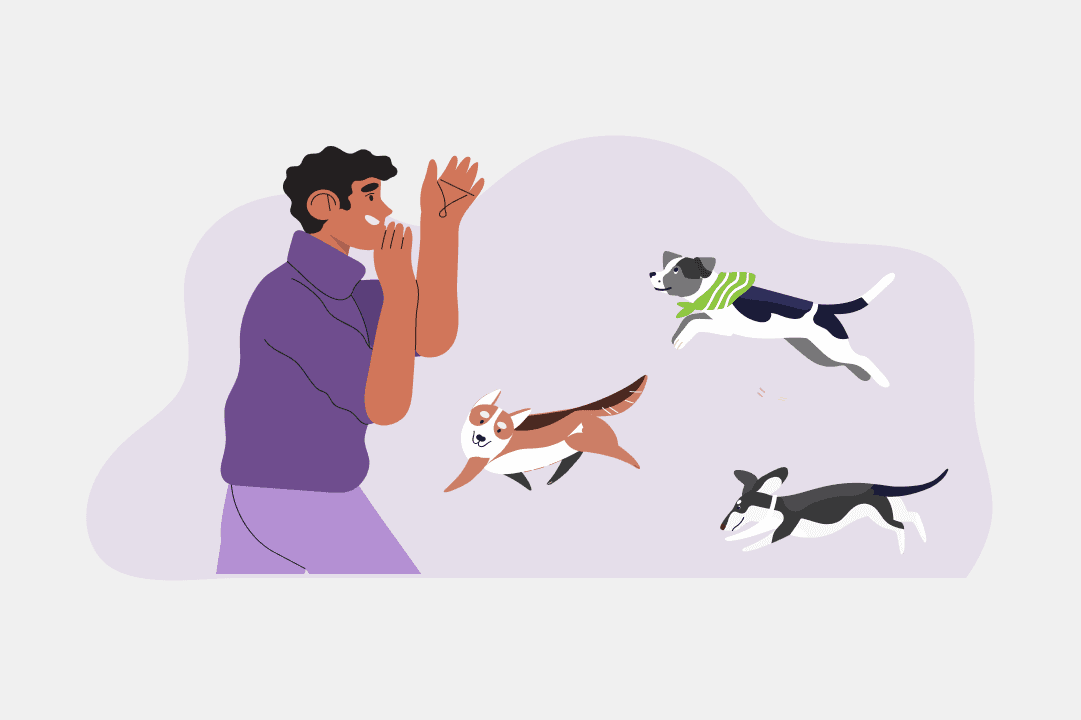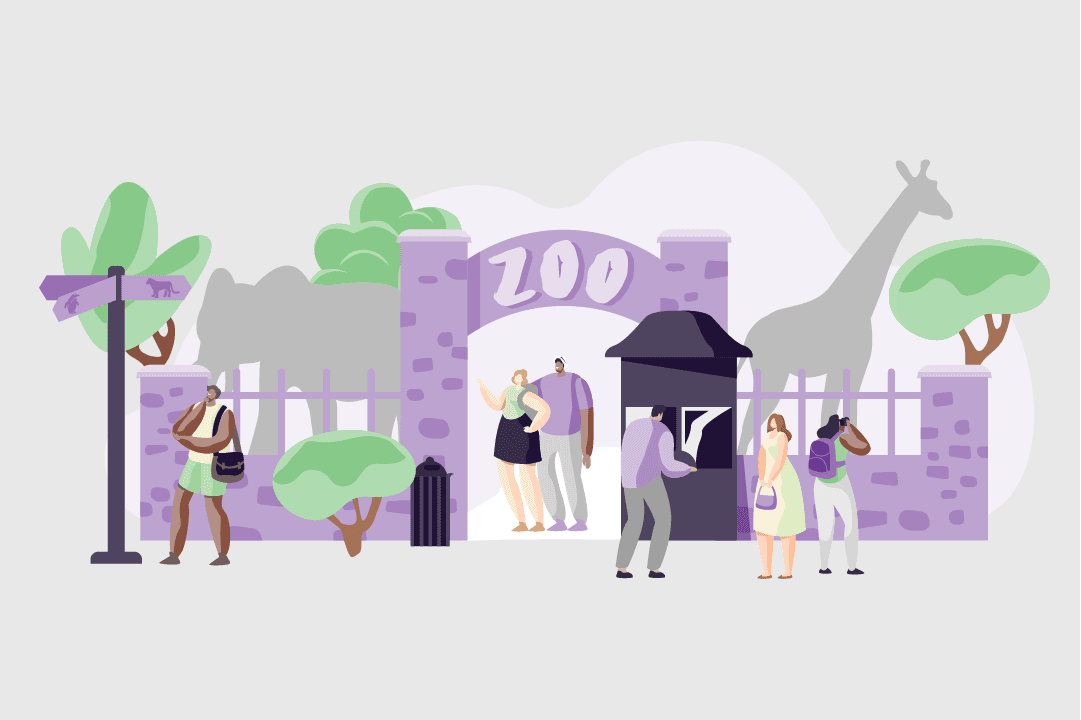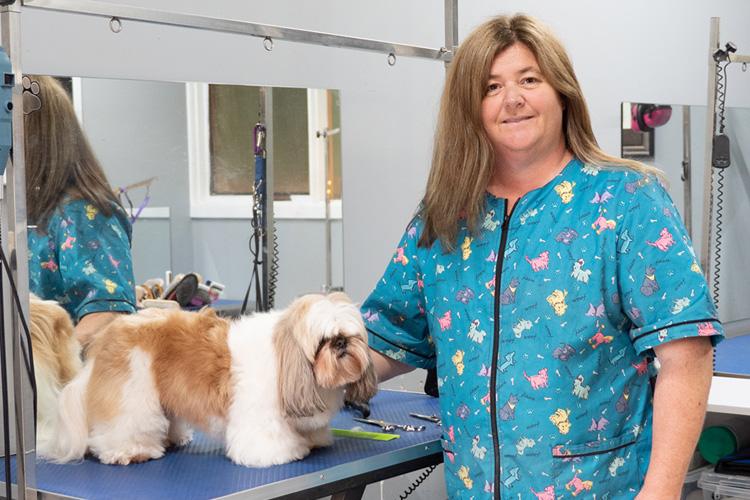Careers with Animals: 23+ Exciting Jobs That Pay Well

Love animals? You may be drawn to these great animal jobs where you get to observe, pat, and play with them everyday. Plus, when you work in animal care, you’re also providing a valuable service to the people who own and/or interact with those animals.
This article explores the best, most exciting animal care jobs. There are so many places your career can go, with many fun, inspiring, and well-paid options.
There are a variety of different specialisations in animal care. This article explores five of the most interesting specialisations and the roles available in each.
Animal conservation
People who work in animal conservation protect our ecosystems and natural environments so that animals can thrive. If you’re going to be working in animal conservation, it’s a prerequisite to love the outdoors. You also won’t be afraid of scales, claws, or antennae, and you’ll be passionate about the environment.
Typical responsibilities in animal conservation include:
- Studying water, plants, and soil to ensure they support animal life
- Studying animals in their natural habitats to better understand their behaviours and the impacts of global change
- Prevent or mitigate environmental hazards and degradation like erosion, pollution, or bushfires
- Protecting the diversity of plants and animals
- Researching, planning, implementing, or advising on projects to restore environments
- Educating the public about the natural world, wildlife, and the environment
Necessary qualifications for this role vary. Some jobs won’t require any particular qualifications. Others will prefer you to have qualifications in animal care or conservation and land management.
More technical roles may require a bachelor’s or master’s degree in animal science, with a focus on areas like environmental science, biology, ecology, or geography. A background in wildlife biology can be essential for some roles, especially those focused on animal research and conservation.
Often, animal conservation is an intrepid, outdoorsy career. It helps if you’re fit, have First Aid qualifications, and can operate a manual car.
Animal conservation jobs |
Average salary |
|---|---|
Conservation and land management officer |
|
Groundskeeper |
|
Ranger |
|
Wildlife rehabilitator |
|
Geographic information systems (GIS) analyst |
|
Conservation scientist |
Veterinary science
Working in the veterinary science field is great for people passionate about animal health. Veterinary nurses and assistants play key roles in veterinary clinics, providing essential support in animal care and treatment.
Most people in the field work with people’s pets, although there are opportunities to work with wildlife too. You may also work in a variety of settings, including veterinary clinics, animal hospitals. boarding kennels and animal shelters.
Typical responsibilities for people in veterinary science include:
- Applying first aid to animals
- Diagnosing and treating pets who are sick or injured
- Educating pet owners about their pets
- Performing surgeries or assisting with surgical procedures
- Spaying pets
- Assisting veterinarians in surgical procedures, patient monitoring, and routine care
- Performing dental procedures as part of animal health management
- Providing medical care, including administering medications and monitoring recovery
- Business management processes like keeping client databases and records, and handling administrative duties
To work in this field, you generally need a qualification in veterinary assistance, veterinary nursing, or veterinary science.
For certain roles, such as a veterinary nurse, a Certificate IV in Veterinary Nursing is required. Veterinary nurses are responsible for a wide range of clinical and administrative tasks, while veterinary assistants support veterinarians and vet nurses, often requiring a Certificate II or III in Animal Studies.
Becoming a veterinarian in particular requires advanced animal studies, including a bachelor’s degree and an accredited Doctor of Veterinary Science degree.
Veterinary science jobs |
Average salary |
|---|---|
Veterinary assistant |
|
Veterinarian |

What is an Animal Carer and How Do You Become One?
Discover the responsibilities and where you could work as an animal carer.
Animal attendant roles
Animal attendant roles are a cornerstone of the animal care industry, offering you a way to make a real difference in the lives of animals.
As an animal attendant, you’ll be responsible for providing basic care and enrichment for animals in settings such as shelters, kennels, and catteries. This role is perfect for those who are passionate about animal welfare and want to ensure that every animal receives the attention and support they need.
Typical responsibilities for people working in animal attendant roles:
- Feed, water, exercise, and provide enrichment for animals.
- Clean enclosures, kennels, cages, and maintain hygiene standards.
- Monitor animal health, behaviour, and report issues or administer basic care.
- Safely handle, move, and restrain animals when required.
- Assist with grooming, bathing, and general animal comfort.
- Support customer enquiries, adoptions, and maintain facility records/supplies.
Animal attendant roles |
Average salary |
|---|---|
Animal attendant |
Working with wildlife
Wildlife workers, including zookeepers and animal attendants, have overlapping interests with conservationists, although you’ll likely spend more time with animals rather than the environments they live in.
You’ll be driven to understand animal behaviour and educate people about wildlife. Wildlife biologists, for example, study animal behavior, monitor populations, and work in both field and laboratory settings to support conservation and research efforts.
Wildlife workers typically:
- Conduct research about particular species or ecosystems
- Teach students or members of the public about animal biology
- Observe animals either in captivity or in their natural environments
- Feed and train animals
- Take on roles that involve working with animals in both field and laboratory settings
Jobs in wildlife can be competitive and highly technical. Often a bachelor, master’s, or even PhD-level qualifications in areas such as zoology, animal behaviour, and biology are required. You’ll also be able to demonstrate your passion for animals through work or research experience, and some wildlife jobs involve working directly with animals in their natural habitats.
If you’re looking to dip your toes in first, you could try a Zoology Certificate.
Jobs where you get to work with wildlife |
Average salary |
|---|---|
Wildlife biologist (including specialisations like marine biologist or primatologist) |

Zoology: Complete Career Guide + Salary | How to Become a Zoologist
Discover the steps to becoming a qualified zoologist and work with animals everyday.
Animal rescue and rehabilitation
For those who are passionate about animal welfare and want to make a direct impact, animal rescue and rehabilitation is a rewarding career path. This field involves working with injured or distressed animals, providing emergency care, and supporting their recovery. Animal welfare officers play a crucial role in this area, often investigating complaints, rescuing animals from harmful situations, and ensuring their safety and wellbeing.
Typical responsibilities for people working in animal rescue and rehabilitation:
- Respond to reports of lost, stray, neglected, or injured animals and ensure their safe capture or transport.
- Provide immediate care, including food, water, shelter, and basic first aid.
- Work with veterinarians to assess health, administer treatments, and support rehabilitation.
- Maintain accurate records of rescues, medical needs, and outcomes.
- Assist with rehoming or adoption processes, including behavioural assessments.
- Educate the community on responsible pet ownership, animal welfare, and prevention of neglect or abandonment.
To get started in animal rescue and rehabilitation, volunteering with animal organisations is a valuable way to gain practical experience and insight into the field. Completing a Certificate III in Animal Care Services can also provide the foundational knowledge and skills needed to pursue a career in animal rescue, helping you make a real difference in the lives of animals in need.
Jobs in animal rescue and rehabilitation |
Average salary |
|---|---|
Animal rescue officer |
|
Wildlife rehabilitator |
Hanging out with pets
If you love domesticated animals, there are many full-time careers and part-time side hustle options for you. These jobs give you low-pressure, flexible opportunities to hang out with and look after pets. You can be a dog walker, dog groomer, dog trainer, or pet sitter, essentially helping pet owners care for their furry friends.
The general tasks required for these jobs vary depending on the specific job. You may:
- Uphold the well-being of companion animals
- Look after pets either at your home or the pet owner’s home, or at a pet day care, kennel, or cattery
- Work as a kennel assistant, kennel attendant, or pet shop assistant, supporting daily operations and animal care
- Give advice and training on animal behaviour
- Ensure that pets are healthy, well-fed, and clean
- Perform grooming tasks such as clipping nails to maintain animal health
- Take on roles that involve caring for pets in various settings, such as stables, kennels, or veterinary clinics
Generally, no qualifications are required for these jobs. Entry-level jobs in pet care, such as kennel assistant or pet shop assistant, often require minimal qualifications, like a high school diploma or basic certificates. You do need to have good business management skills, as you will typically be self-employed and advertise your services to prospective clients.
You’ll likely need an ABN. You’ll also need to demonstrate that pet owners can trust you, so a certification in Pet First Aid can be useful, as well as certifications in animal science, animal management, and/or animal handling. To significantly boost your client base, you can also get formal certification in pet grooming, pet care, or training skills
Jobs where you get to hang out with pets |
Average wage |
|---|---|
Dog walker |
|
Pet sitter |

From Retail Manager to Dog Groomer: An Inside Look into the Animal Care Industry
Find out exactly how one woman turned her passion for animal care into a full-time business.
Animal behaviour and training
Understanding animal behaviour and providing effective training are essential for improving the well-being of companion animals and strengthening their relationships with humans. Careers involving animals in this field include dog trainers, animal behaviourists, and even roles in veterinary nursing, where behaviour management is key.
Typical tasks of people working in animal behaviour and training:
- Assess animal behaviour to identify needs, temperament, and problem behaviours.
- Develop and implement training programs using positive reinforcement and other approved techniques.
- Teach animals basic obedience, socialisation, and specialised skills (e.g., assistance or performance tasks).
- Monitor progress and adjust training plans to suit individual animals.
- Educate and guide owners or handlers on effective training methods and behaviour management.
- Maintain detailed records of training sessions, progress, and behavioural observations.
To become an animal behaviourist or trainer, you might consider completing a Certificate III in Companion Animal Services or pursuing a Bachelor’s degree in Animal Science. These qualifications provide a strong foundation in animal behaviour, training techniques, and animal welfare, helping you build a successful career working with animals.
Agriculture
Farming in Australia is a very diverse industry with opportunities to work with animals. Animal agriculture involves breeding animals to produce animal products. Animal lovers may enjoy working to collect products like wool, milk, eggs, or honey, especially through humane farming practises that meet RSPCA guidelines. There are also non-farming roles in agriculture that emphasise animal welfare and environmental sustainability.
Working in agriculture, you may:
- Implement or develop sustainable farming processes
- Test soil or water quality
- Ensure that animals are healthy
You don’t need specific qualifications to work in agriculture. However, qualifications in agriculture, horticulture, animal husbandry, environmental science, or geography can be useful, and an undergraduate degree will be required for some roles.
Jobs in agriculture that involve caring for animals |
Average salary |
|---|---|
Animal nutritionist |
|
Equine vet |
|
Ecologist |
|
Farm manager |
|
Sustainability consultant |
![Agriculture: A Beginner’s Guide for 2021 [Updated]](https://www.training.com.au/wp-content/uploads/Agriculture-Pillar_Feature.png)
Agriculture: A Beginner’s Guide for 2021 [Updated]
Learn all the steps you need to take to start your own agricultural career in Australia.
Working with animals gives you lots of opportunities to hang out with creatures both cuddly and majestic. Your career path is all about caring for their health and welfare while also making an impact in the human world: supporting ecosystems, maintaining the wellbeing of our four-legged friends, or allowing people to witness the diversity of the natural world.
Ready to take the first step towards your career in animal care?
